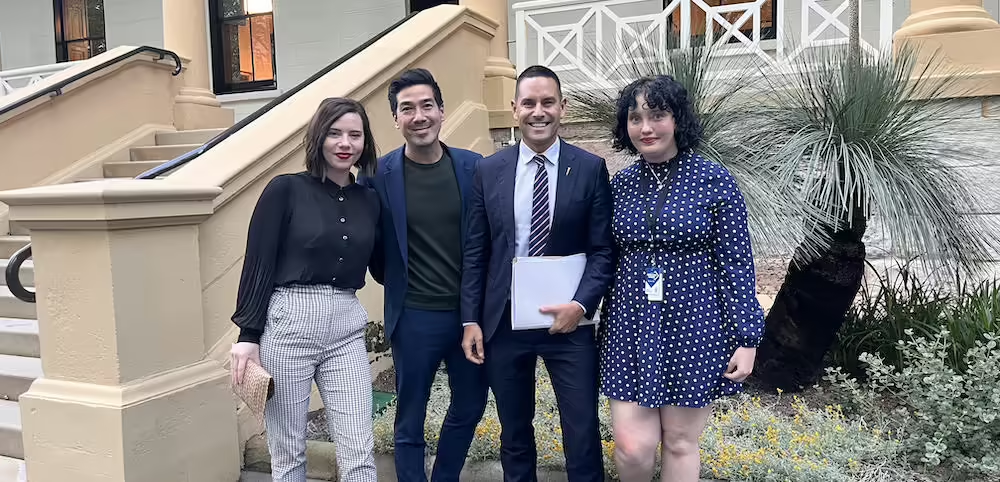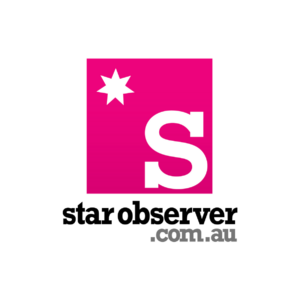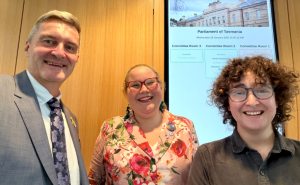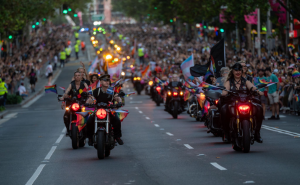
Last week, with the support of the Labor Government, Independent MP Alex Greenwich‘s Equality Bill finally got over the line in NSW Parliament.
It was something to celebrate: the Equality Bill is enormous, and includes major wins for the community. It includes allowing transgender people being able to change their birth certificate without needing to have gender-affirming surgeries, protections for rainbow families and sex workers, and makes threatening to “out” an LGBTQIA+ person an offence — and much, much more.
But not everyone in the community was happy – the Equality Bill did include more, and elements were cut before the final bill passed.
So, we spoke to Alex Greenwich and NSW Rainbow Labor convenors Savanna Peake, Mits Delisle and Cheyne Howard, and asked them everything the community wanted to know about the Equality Bill, what was cut, and where we go from here with getting all the reforms our community needs, done.
There was obviously a lot to cover — this bill is huge, and our community had a lot of questions. So we’ve published the conversation in full, to ensure all your questions are answered.
Alex, you’ve been fighting and working on the Equality Bill for such a long time. What was it exactly that made you keep fighting to get this one over the line and supported?
Alex Greenwich: This has been a long overdue reform. New South Wales was coming last when it came to LGBTQ rights and it was time that, in the interest of the safety and dignity of our community that we changed that.
I announced the bill in 2022, and campaigned on it during the last state election. Obviously, you know, received a lot of abuse and harassment from certain elements of politics, particularly the right-wing element. But you know, all those attacks, all of those threats, all that harassment. It just really solidified my resolve to get this done, because if this was what I was experiencing, imagine how hard the situation was for vulnerable LGBTQ people right across the state.
How has it felt as conveners of NSW Rainbow Labor to come together to support the Equality Bill?
Mits Delisle: Rainbow Labor is a grassroots organisation, so we as Labor members have been working within our branch meetings, at conferences statewide, federally, to pass legislation, including that which is in the bill. So now that we’re in government in New South Wales, we saw this as an amazing opportunity and a fantastic time to get a lot of these advancements through.
Savanna Peake: Alex was spearheading this from the very beginning, and really offered us the seat at the table in terms of trying to get the bill moving, which we’re very thankful for. I think that kind of collaboration was really special, and not something that’s commonly seen all the time. And I think it shows that there’s a capacity to work across party lines, with other political parties and members to try and get reforms through. And we would also like to acknowledge Felicity Wilson from the North Shore, who was an ally in support of this bill as well.
Do you think it should be more commonplace for people across parties coming together to do what’s right for our community?
Alex Greenwich: New South Wales actually has a really good history of multi-partisan work towards supporting the LGBTQ community. So I was so grateful to work with Rainbow Labor to get as much of this bill through as possible — and we’re going to get the rest done as well, by the way — because we didn’t have the same multi-partisan approach this time as we previously have had.
Felicity Wilson was the only member of the Coalition who voted for the Equality Bill. In previous parliaments, going back to the 80s, the Coalition would have always allowed a conscience vote on these matters, so it was concerning for me to see a bit of a right-wing turn within the Coalition on how they approached this bill. But that said, I think Felicity really stood up, not only for our community, but also for the traditions of her party, which has always [previously] allowed members to support these types of reforms.
How do you all feel that the Equality Bill will positively impact NSW’s LGBTQIA+ community?
Cheyne Howard: This bill is incredibly personal for me. My sister is a trans woman, and she was in my mind this whole time. And my best friends are trans husband and wife, and just talking to them about it in recent days, the joy on their faces, they look like they’ve had this weight lifted off their back knowing that they’re going to be able to change their birth certificate. It’s so good, and I just see that joy and that relief in them, and I just know that that’s something that’s being felt by the whole community. To even just have a part in it is just, it’s just amazing. And I think that this is going to be absolutely life changing for a lot of people in our community. I think it will have an incredibly positive impact, and it’s only gonna get better from here.
Mits Delisle: For me personally; I’m part of Rainbow Families as well. A lot of our friends have created their families through international surrogacy, and the issues that they’ve all faced in terms of identification have been a major concern. So that is a major win in terms of birth certificate reform. This is just something that is so overdue.
To be able to be a small part of delivering these major reforms has been a total honour. So many of these items have been on our agenda for a long, long time, and to actually be able to pass them in this massive block, it’s really historical, and we’re so thankful for Alex and his work.
There’s so much here to celebrate. It’s really lifting so many parts of our community and the much broader community up. And it really speaks to those people who are most vulnerable. It talks to their integrity, their identity, their safety. It’s a game changer.
Savanna Peake: Yesterday, I had one of my new staff members that I’ll be working with in my new role come to my office and ask me to sign their self ID documents, to change their gender to be recognised as female. That was really a golden moment for me, because obviously working on this for so many months and seeing it go through the Parliament was one thing, but actually seeing the day-to-day life-changing effects that this is having for people in our community was really quite amazing.
I think all of the domestic violence provisions are really important as well. We know that in the LGBTQ+ community there is such a high prevalence of domestic violence, and threatening to out people is now recognized as an offence, which I think is really important.
And stigmatising language used around HIV and AIDS being removed was another really critical thing for me. I’m a very close friend of David Polson, and he’s just been through so much when it comes to the HIV community and history. I think that those types of stigmatising language in the bill were just quite negative in terms of the impact it was having on the community. So I think that’s really great. I think the discourse that we’re using really should be positive, and I’m glad that the bill has addressed that.
Alex Greenwich: One of the major parts of this reform was the ability for trans people to update their birth certificates to make sure they’re accurate documents, and my office has been flooded with emails from parents and trans people just so excited that this is so affirming of their identity. That has meant a lot to me.
Also the fact that New South Wales is legally recognising non-binary as a sex descriptor. I don’t think we should underestimate that through legislation, we affirmed a new sex in New South Wales, and that is non-binary. There’s been a lot of people involved in legal challenges getting non-binary recognised on their birth certificate, so we’re able to do that in a week.
The other thing is, families who have been through stigma their entire life, but to have our parliament affirm their families as loving families, which can now have access to parentage orders was huge.
Also one of the really big and long overdue things which we did was positive reforms for sex workers. So ensuring that sex workers can use their income to look after others, which at the beginning of last week was not allowed, and also that there are protections from people threatening to out them.
To see the Parliament be affirming to sex workers, and the conversations which we’ve had about further protections have been really great. But also, for me to see a government, a Labor government, really celebrate achieving these reforms, just stand up and applaud themselves, that just gives me so much hope and encouragement that we’re going to get the rest of the stuff done.
Obviously we do have to talk about the fact that some members of the community feel that there wasn’t enough in the bill, or somewhat betrayed by certain elements of the bill being taken out. Alex, you said that you decided to choose progress over defeat. Can you explain that a little more?
Alex Greenwich: Sure thing. So the government had set expectations with myself and across the community that there weren’t going to be any changes to the anti-discrimination through my bill, and they were going to deal with them once the Law Reform Commission process had concluded. So that expectation had been set.
Now obviously I would have liked to have seen those reforms achieved through my bill. But the reality was that that was not going to be possible. So we still have a really clear and strong pathway to achieve those reforms, and we do so with the confidence that we’ve got these ones done, that we’ve got some major reforms through.
In terms of the other stuff that was taken out of the Equality Bill, it’s largely been things that either advocates wanted me to remove or that have already been delivered. So I guess I found it frustrating and disheartening that there were some who just thought to attack members of our community for actually delivering results for our community, and not actually engaging in the details or the process.
It’s really easy to stand on the sidelines and attack those who are trying to achieve those reforms. It’s a lot harder to campaign to deliver those reforms, but that’s what I’m going to be doing, and that’s what I know Rainbow Labor is going to be doing. I can deal with, and I’ve dealt with, attacks from the far-right conservatives; I’ve had all sorts of threats, some have been quite widely reported, some haven’t, but the attacks from within the community were hurtful. And they came at a time when we were trying to deliver significant progress, and those attacks really sought to diminish what we were achieving, and sought to diminish the struggles and challenges of the trans community, of sex workers, of rainbow families who had worked really hard for these reforms.
I mean, would they have preferred that the Equality Bill was voted down and we could be glorious in defeat? I don’t think so. I am always someone who is focused on delivering outcomes, and I always have. I said I would decriminalise abortion; I decriminalised abortion. I said I would legislate voluntary assistance to die; and I legislated voluntary assistance to die. I said I would legislate self ID; I legislated self ID.
And we’re going to change the anti discrimination act to protect sex workers and to protect teachers and students. That’s going to happen. People can either throw shade at us, or they can work with us. If they work with us, it will make achieving those reforms a lot faster and a lot easier.
Rainbow Labor folks: choosing progress over defeat. What are the thoughts on that, and how the community was feeling about this bill?
Mits Delisle: Anti-discrimination, greater protections for students and teachers, is what we took to this last conference. It’s what we’ve been talking about for over 20 years, and we’ll continue to advocate and work within the party to deliver those major reforms.
I also think it’s been a pretty good year. NSW Labor, we’ve introduced laws that ban harmful conversion practices, we’ve formally apologised for laws criminalising homosexual acts, we’ve supported all the recommendations of the special commission into historical LGBTQIA+ hate crimes. And we’ve endorsed and supported the equality bill. That’s all in 2024.
In addition locally, we’ve supported community led projects like Qtopia. We’ve opened the Pride Centre in the Inner West. I mean, overall, I would say we have a pretty good track record. And that goes to advocacy and support from people like Penny Sharpe and obviously leadership by Chris Minns.
Savanna Peake: I second that. We did take to conference that we wanted to proceed with protections for students and staff in private educational institutions. And I spoke on it because I used to be a teacher, and obviously I’m a lesbian, and I worked in public schools.
So I’m really glad to see that there is a lot of community support behind trying to get reforms in those areas. And we were working with Alex and Equality Australia and Rainbow Families, so I think moving forward a coalition of community groups and supporters will come together to try and push that forward.
And after the Census issue that came up earlier this year, we have a really strong network of Rainbow Labor teams across states and territories, and we know that moving forward, federally as well, we have the ability to mobilise those groups and organise to try and get things done. So we’re looking forward to being able to meet with our colleagues in the coming months to try and arrange a national and state campaign on that issue in particular.
Cheyne Howard: I just wanted to echo a little bit about what Alex said about choosing progress as well. This bill that was passed gave people dignity and safety, and that isn’t something that we should underestimate. And I think it’s really important as a community that we come together and we celebrate this.
This is a massive step, and we need to recognise and keep pushing the message that there are pathways to continue making that change, to see even more. But this bill has changed people’s lives a lot, and it’s something that we should celebrate. It’s like it’s a massive step, and it shouldn’t be underestimated by the community at all.
Let’s talk about next steps forward. Are there any sort of plans or work being done to address some of the issues that we didn’t manage to get into the bill this time around?
Alex Greenwich: The bill passed the LC on Thursday night. On Friday, I was already talking to stakeholders and colleagues about protections for sex workers and what the process would look like there for the review of summary offences act.
I’ve started strategising with colleagues about how we’re going to deal with the changes to the anti-discrimination act and some of the other reforms that we need to deal with, particularly in terms of the policing of our community.
So we’re going to get those all done, and they will be delivered. We need to be working together as a community.
I watched some of the political extremes of the debate in the chamber. There were people to the far left of me who have an all-or-nothing approach, then there were people to the far-right of me who have a nothing approach. The result is the same: no change, no reforms, no protection. I’ll always pick outcomes and I’ll always pick results for my community over political opportunism.
Mits Delisle: Rainbow Labor has also started organising in their meetings to discuss anti-discrimination reform, but that’s an ongoing project.
Savanna Peake: We’ve looked at the ALP 2023 platform from federal conference, and a lot of the things that [Labor] committed to have been delivered so far, like the investments around HIV and the elimination of transmissions with the National HIV task force. So we invested $49 million into that this year.
Also, we had committed to delivering the census for LGBTQIA+ people. So it’s been good to see that some of those platforms have been made and basically got a bit of a list of asks that we’ve got moving forward that exist outside of the Equality Bill in New South Wales that we plan on trying to hopefully get some action on as well moving forward.
Mits Delisle: And I guess the big thing is, we’re all waiting for the findings from the Law Reform Commission review, and that’s when we will [see].
Savanna Peake: A lot of the power that we’ve got is members like Penny Sharpe, who’s been a historic member of Rainbow Labor, Prime Minister Anthony Albanese has marched with alongside Rainbow Labor for 35 years. So a lot of our Members of Parliament are members of Rainbow Labor as well, so I think having those kinds of relationships really strengthens our ability to be able to try and push some of these things.
We’ve spoken about how it should be commonplace for parties and politicians to work together like this, and that the community should come together. But what else can we be doing to move forward from this point?
Alex Greenwich: What really made the difference in terms of both, from rainbow families, from the trans community, from sex workers, was sharing people’s personal stories with people in Parliament. Sharing stories with their local members, with members of the upper house. That is what will change hearts and minds.
I know it sounds cliche, but I’ve been involved in LGBTQ law reform for decades. That’s how we won marriage equality, that’s how we got this bill through. It is people sharing their stories with my parliamentary colleagues, and having them open their hearts and their minds to the importance of these reforms.
Savanna Peake: I suppose we saw this during the Equality Bill lead-up; a lot of the correspondence received by the MPs is quite powerful as well. So I think starting a community campaign to try, and I’ve already seen people have started emailing members, around provisions for students and teachers, in particular, in schools.
So I think these people are being held in their positions by their community. And so I think that for Members of Parliament in particular, hearing from the members of their electorate, their voters, about how they feel on this issue is really important and helps to build positive momentum for the movement as well.
Is there anything else on this that any of you would like to mention?
Alex Greenwich: I saw during the marriage equality campaign how we got that done with the support of Rainbow Labor, with building the rapport, with building support for it through their various conferences, and ultimately playing the key role in delivering that reform. But it was that that gave me the confidence and encouragement to reach out to Mits, Savanna and Cheyne and Rainbow Labor to partner with them to get this done.
These reforms would not have been achieved if it wasn’t for Rainbow Labor — I can’t be more honest or more clear about that. We met with dozens of MPs. We travelled right across Sydney to MPs’ offices to meet with them, answer their questions, and give them the support they needed. My name may be on the bill, but this is Rainbow Labor’s, too.
Mits Delisle: I would say, on behalf of Rainbow Labor, we’re very thankful to Alex, and it’s been a pleasure.
Savanna Peake: Yeah, it really has been a pleasure. Alex has included us and given us a seat at the table. He has platformed us and just celebrated this win alongside us, and we feel so grateful to him for that. And I think that it just kind of strengthens our resolve moving forward.
New South Wales Labor MPs were very willing to hear our concerns, they were willing to learn about the bill from Alex, they were willing to ask questions and really sought clarification from us and approached it with an open mind. When it comes to these types of critical reforms, it’s really great to see that that consultation and that transparency has been there, and I would really like to see that continue moving forward, both within New South Wales and federally.
And I think it should be mentioned, Chris Minns has displayed a really progressive agenda for the queer community, and I think that should be something that’s really celebrated. As Mits mentioned earlier, we’ve delivered a lot for the queer community of NSW particularly this year, and he was such a critical part of this finally getting on to the Parliament floor and getting over so quickly, so I have to really recognise his commitment to the community.
Cheyne Howard: I just want to second all of that, and also just say, like a big thank you to the whole community and congratulate them.
These kind of reforms come from the community, using their voice and telling people like Alex and other lawmakers what they want and what they need and you know, the stories are so powerful. Their voice is so powerful for a community that has been through so much.
We came together, you know, raised our voice and said what we want and what we needed, and I want to thank every person who sent an email of support to help get this across the line. This is your win, too, and you should be incredibly proud of yourselves.




